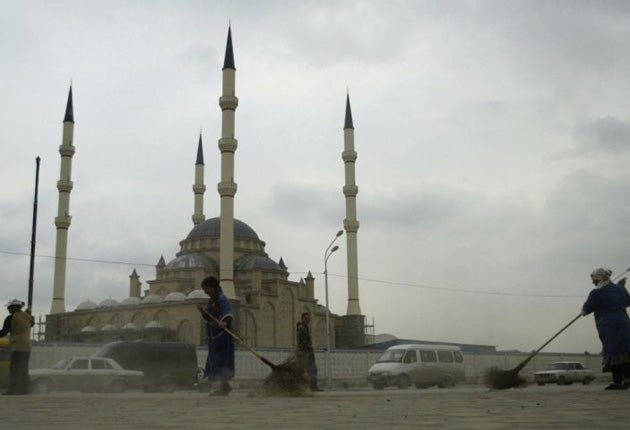A reminder of a war that barely registers in Moscow

Your support helps us to tell the story
From reproductive rights to climate change to Big Tech, The Independent is on the ground when the story is developing. Whether it's investigating the financials of Elon Musk's pro-Trump PAC or producing our latest documentary, 'The A Word', which shines a light on the American women fighting for reproductive rights, we know how important it is to parse out the facts from the messaging.
At such a critical moment in US history, we need reporters on the ground. Your donation allows us to keep sending journalists to speak to both sides of the story.
The Independent is trusted by Americans across the entire political spectrum. And unlike many other quality news outlets, we choose not to lock Americans out of our reporting and analysis with paywalls. We believe quality journalism should be available to everyone, paid for by those who can afford it.
Your support makes all the difference.Islamic militants emerged as the most likely suspects behind the Moscow airport attack. There has been no claim of responsibility but early witness reports suggested the bomber had a "North Caucasus appearance".
Russia fought two wars to regain hold of Chechnya in the late 1990s and early 2000s, and the region has been rebuilt and is run by the Kremlin-friendly former fighter Ramzan Kadyrov. But in Chechnya, and even more so in neighbouring Ingushetia and Dagestan, elements of an insurgency remain. They are nominally led by Doku Umarov, self-styled "Emir of the Caucasus", who says he wants to create an Islamic caliphate across the Caucasus.
Nobody knows exactly how many people are actively involved in the insurgency, although in Dagestan many people admit to having sympathy with those who "go to the forest", citing police brutality, corruption and unemployment as reasons for disenchantment among youth.
Terrorist attacks in the North Caucasus on police and security forces are frequent. Almost daily in Dagestan and Ingushetia, there are reports of policemen killed, traffic police shot at, or shoot-outs between security forces and militants. The battle against the insurgency in the North Caucasus is a low-grade war that rarely features on the news bulletins of state-controlled television, except for occasional reports that "bandits" have been "liquidated".
Attacks on civilians, and attacks in Russia proper, are much rarer, but when they do come, they remind people in Moscow of the ongoing instability in the south of the country. Last year's attacks on the Moscow Metro caused anxiety in the capital for a while. The latest attack will again raise awareness of Russia's enemy within.
President Dmitry Medvedev has already vowed to catch those responsible for yesterday's attack, and there may well be increased military operations in the North Caucasus. Security measures will doubtless be increased at airports and other infrastructure installations. But the North Caucasus is, after all, part of Russia, and it's doubtful whether even the most stringent security could prevent the most determined suicide bombers.
For that, they will need to end sympathy for the insurgency in the Caucasus, whether by force or by persuasion, a goal which seems more elusive with every terrorist atrocity. In 1999, Vladimir Putin, who had been recently made Prime Minister by Boris Yeltsin, famously promised to "waste" terrorists in the "outhouse". More than 11 years later, the terrorists have shown again that they can strike at the very heart of Russia.
Join our commenting forum
Join thought-provoking conversations, follow other Independent readers and see their replies
Comments